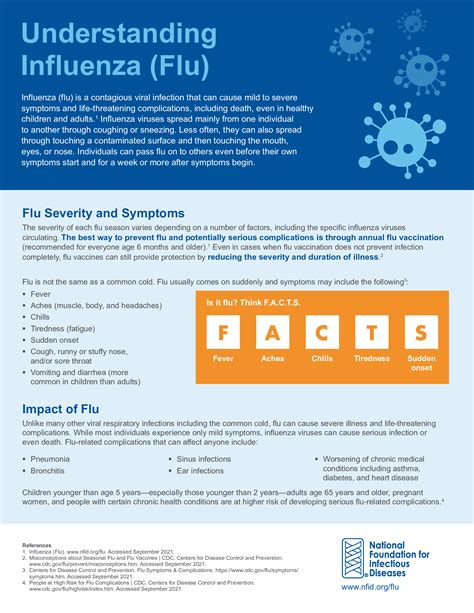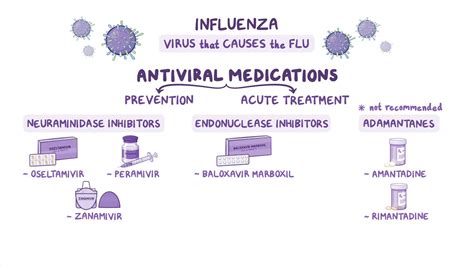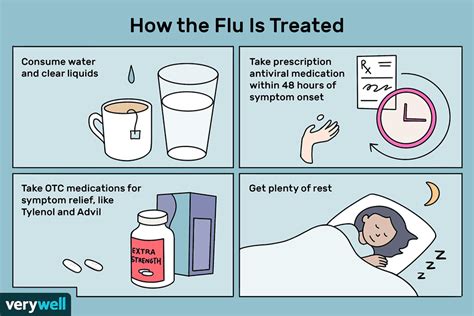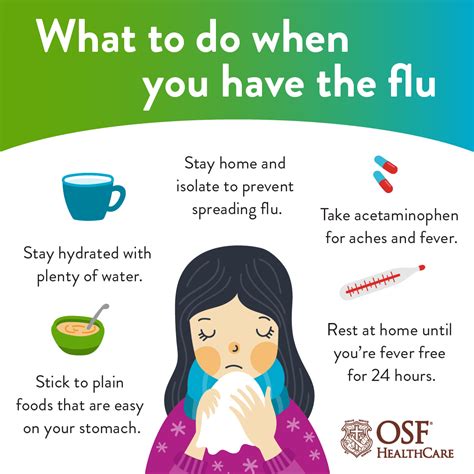Intro
Discover 5 effective flu treatments, including natural remedies, over-the-counter medications, and antiviral drugs, to alleviate symptoms and reduce recovery time, exploring influenza relief options and prevention methods.
The flu, also known as influenza, is a highly contagious respiratory illness that can cause mild to severe symptoms. It is essential to seek medical attention if you or a loved one is experiencing flu-like symptoms, as early treatment can help alleviate symptoms and prevent complications. In this article, we will discuss the importance of flu treatments and explore various options available to manage and cure the flu.
The flu can affect anyone, regardless of age or health status, and can lead to serious complications, such as pneumonia, bronchitis, and sinus infections. According to the Centers for Disease Control and Prevention (CDC), the flu affects millions of people in the United States each year, resulting in thousands of hospitalizations and deaths. Therefore, it is crucial to understand the available treatment options and take proactive steps to prevent and manage the flu.
Flu treatments can help reduce the severity and duration of symptoms, as well as prevent complications. There are several types of flu treatments available, including antiviral medications, over-the-counter medications, and home remedies. In this article, we will delve into the world of flu treatments, exploring the benefits, working mechanisms, and steps to take to manage and cure the flu.
Understanding the Flu

To understand the flu, it is essential to recognize the symptoms, which can range from mild to severe. Common symptoms of the flu include fever, chills, cough, sore throat, runny or stuffy nose, muscle or body aches, headaches, and fatigue. If you are experiencing any of these symptoms, it is crucial to seek medical attention to determine the best course of treatment.
Types of Flu Treatments

- Antiviral medications: These medications can help reduce the severity and duration of flu symptoms, as well as prevent complications. Antiviral medications work by targeting the influenza virus and preventing it from replicating.
- Over-the-counter medications: These medications can help alleviate symptoms, such as fever, headache, and body aches. Over-the-counter medications include pain relievers, decongestants, and cough suppressants.
- Home remedies: These remedies can help manage symptoms and promote recovery. Home remedies include rest, hydration, warm baths, and steam inhalation.
Antiviral Medications
Antiviral medications are prescription medications that can help treat and prevent the flu. These medications work by targeting the influenza virus and preventing it from replicating. Antiviral medications can help reduce the severity and duration of flu symptoms, as well as prevent complications.Some common antiviral medications used to treat the flu include:
- Oseltamivir (Tamiflu)
- Zanamivir (Relenza)
- Amantadine (Symmetrel)
- Rimantadine (Flumadine)
Benefits of Flu Treatments

- Reduced severity and duration of symptoms
- Prevention of complications, such as pneumonia and bronchitis
- Reduced risk of hospitalization and death
- Improved quality of life
- Reduced economic burden
Working Mechanisms of Flu Treatments
Flu treatments work by targeting the influenza virus and preventing it from replicating. Antiviral medications, for example, work by inhibiting the production of viral proteins, which are essential for the virus to replicate. Over-the-counter medications, on the other hand, work by alleviating symptoms, such as fever and body aches.Steps to Take to Manage and Cure the Flu

- Seek medical attention: If you are experiencing flu-like symptoms, it is crucial to seek medical attention to determine the best course of treatment.
- Take antiviral medications: If prescribed, take antiviral medications as directed to help reduce the severity and duration of symptoms.
- Practice good hygiene: Wash your hands frequently, avoid close contact with others, and avoid touching your eyes, nose, and mouth.
- Stay hydrated: Drink plenty of fluids, such as water, soup, and electrolyte-rich beverages, to help your body recover.
- Get plenty of rest: Rest can help your body recover from the flu, so make sure to get plenty of sleep and avoid strenuous activities.
Practical Examples and Statistical Data
According to the CDC, the flu affects millions of people in the United States each year, resulting in thousands of hospitalizations and deaths. In the 2019-2020 flu season, for example, there were an estimated 38 million cases of the flu, resulting in 400,000 hospitalizations and 22,000 deaths.Prevention and Management of Flu Complications

- Get vaccinated: The flu vaccine can help prevent the flu and reduce the risk of complications.
- Practice good hygiene: Wash your hands frequently, avoid close contact with others, and avoid touching your eyes, nose, and mouth.
- Take antiviral medications: If prescribed, take antiviral medications as directed to help reduce the severity and duration of symptoms.
- Stay hydrated: Drink plenty of fluids, such as water, soup, and electrolyte-rich beverages, to help your body recover.
Conclusion and Final Thoughts
In conclusion, flu treatments can provide several benefits, including reduced severity and duration of symptoms, prevention of complications, and improved quality of life. By understanding the types of flu treatments available, including antiviral medications, over-the-counter medications, and home remedies, individuals can take proactive steps to manage and cure the flu. Remember to seek medical attention if you are experiencing flu-like symptoms, practice good hygiene, stay hydrated, and get plenty of rest to help your body recover.We invite you to share your thoughts and experiences with flu treatments in the comments section below. Have you or a loved one experienced the flu? What treatments did you use, and how effective were they? Share your story to help others understand the importance of flu treatments and take proactive steps to manage and cure the flu.
What are the symptoms of the flu?
+The symptoms of the flu include fever, chills, cough, sore throat, runny or stuffy nose, muscle or body aches, headaches, and fatigue.
How can I prevent the flu?
+You can prevent the flu by getting vaccinated, practicing good hygiene, avoiding close contact with others, and avoiding touching your eyes, nose, and mouth.
What are the benefits of antiviral medications?
+Antiviral medications can help reduce the severity and duration of flu symptoms, as well as prevent complications, such as pneumonia and bronchitis.
